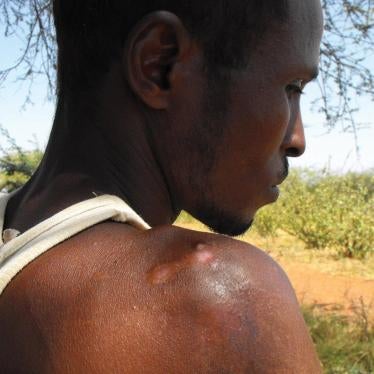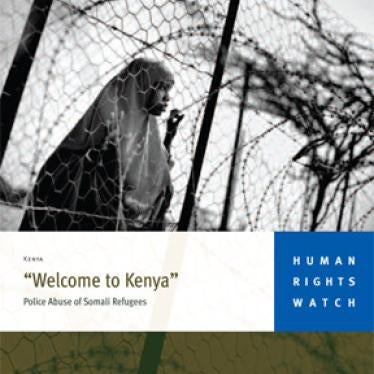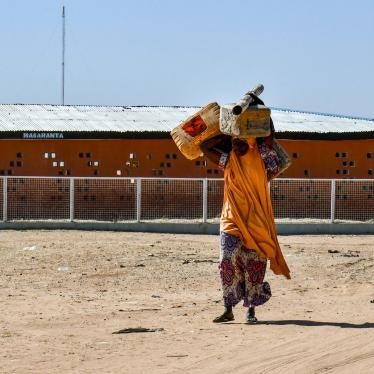The Kenyan authorities have deported 359 Somalis, including at least three registered refugees, since the start of their security crackdown in early April 2014, Human Rights Watch said today. The authorities have not allowed any to challenge their removal to conflict-ridden Somalia. In the latest move, Kenya deported 98 people, including 12 children, to Mogadishu on May 20 without warning the UN refugee agency (UNHCR) about the deportation.
Returning refugees constitutes refoulement, the unlawful forced return of people to situations where they risk being persecuted, tortured, or exposed to other serious harm arising from generalized violence. Some of those deported were known to be refugees, but Kenya also very likely also committed refoulement when it deported undocumented Somalis without first identifying those wishing to claim asylum. Kenya stopped registering urban asylum seekers in December 2012, which means Somalis arriving in Nairobi and other cities since that time have been unable to claim asylum.
“Deporting people to conflict zones in Somalia shows a total disregard for their rights and their safety,” said Gerry Simpson, senior refugee researcher at Human Rights Watch. “What little remains of Kenya’s shaky reputation for respecting basic refugee rights is fast disappearing.”
The May 20 deportation was the fourth time Kenya has summarily deported Somalis to Mogadishu by plane since the authorities began their massive security crackdown in Nairobi and other cities on April 1. The operation has led to widespread abuses against Kenyans and foreign nationals alike, including arbitrary detention in appalling conditions for periods well beyond the 24-hour limit set by Kenyan law. According to UNHCR, those deported on May 20 were detained for between 10 and 30 days in numerous detention facilities.
According to UNHCR, on April 9, the Kenyan authorities deported 83 people, followed by 91 on April 17, and 87 on May 3. UNHCR said the Kenyan authorities denied the agency access to the first three groups of deportees before they were removed from Kenya.
UNHCR also told Human Rights Watch the first three groups of deportees included three recognized refugees. In Mogadishu, Human Rights Watch interviewed one of these refugees, Mariam, a 32-year-old mother of three. A resident of the Kakuma refugee camp in northwestern Kenya, Mariam was arrested while visiting Nairobi. She was among the 83 people deported on April 9 after Kenyan authorities refused to accept her refugee status document. Mariam’s children, ages 5, 10, and 15, remain in Kakuma with her elderly father.
“I hope the government of Kenya will let me go back to my family,” she said. “The only home I have is that refugee camp.”
Kenyan officials have said that they plan to deport all undocumented Somali nationals as part of the response to recent grenade and other attacks in Kenya by unidentified people.
In January, UNHCR issued guidelines on returns to Somalia and called on countries not to return anyone before interviewing them and ensuring they do not face the threat of persecution or other serious harm if returned. UNHCR said that Somalia remains “a very dangerous place” and that no Somali national should be “forcibly returned to Somalia unless the returning state is convinced that the persons involved would not be at risk of persecution.”
In April, the UN reported that a recent joint military offensive by the African Union Mission to Somalia (AMISOM) and the Somali National Armed Forces (SNAF) in south-central Somalia against the group al-Shabaab had once again displaced many people.
In January, UNHCR said 1.1 million people were displaced within Somalia, including 369,000 in Mogadishu. In a March 2013 report, Human Rights Watch found that members of state security forces and armed groups had raped, beaten, and otherwise mistreated displaced Somalis in Mogadishu. A February 2014 Human Rights Watch report documented high levels of rape and sexual abuse against displaced women and girls in the capital throughout 2013.
In April, the UN refugee agency said that it was “disturbed” by reports of harassment and other abuses against Somalis during round-ups and called on the Kenyan authorities not to return Somalis “against their will to a place where their lives will be exposed to risk.”
On May 16, the African Peacekeeping Mission in Somalia (AMISOM) called on Kenya to end its deportation of Somalis.
Universal refugee and human rights law prohibit refoulement – forcible return to persecution on account of race, religion, nationality, membership of a particular social group, or political opinion, to a situation where a person would be at real risk of torture or cruel, inhuman, or degrading treatment.
Under the 1969 African refugee convention, which Kenya is bound by, the prohibition on forced return is broader than the risk of persecution, and also prohibits return to places where a person’s life, physical integrity, or liberty would be threatened by events seriously disturbing public order.
Kenyan immigration law allows the authorities to regulate who should be in Kenya, and Kenya may prevent certain categories of people from entering or remaining in the country, including those deemed to be a security threat. However, Kenya may never return anyone to persecution or to a place where there is a real risk of torture or cruel, inhuman, or degrading treatment.
The ban on refoulement means Kenya may not return anyone who says they fear harm if deported, regardless of when the person entered Kenya and for how long they may have lived in the country without authorization. Although Kenyan refugee law says an asylum seeker should lodge their claim with the authorities within 30 days of arrival, the fact that Kenya has suspended registration of urban asylum seekers makes compliance with the law impossible for asylum seekers who arrived after December 2012.
UNHCR does not impose any such deadline. In fact, UNHCR’s Executive Committee, of which Kenya is a member, has formally stated that failure to comply with filing deadlines “should not lead to an asylum request being excluded from consideration.”
The Kenyan government should allow any Somalis identified for deportation to challenge their deportation in court or to claim asylum with the Kenyan authorities or UNHCR, Human Rights Watch said. UNHCR should be given unrestricted access to any Somali identified for possible deportation.
“If Kenya is unwilling to stand by its national and international legal obligations and register asylum seekers and consider their claims prior to deportation, it should allow UNHCR to step in,” Simpson said.








